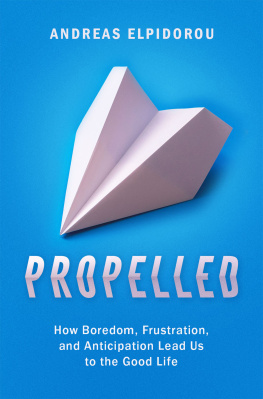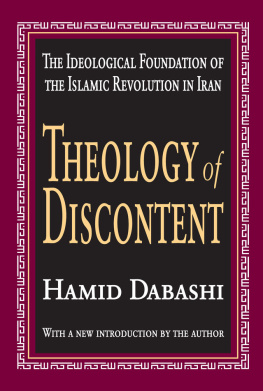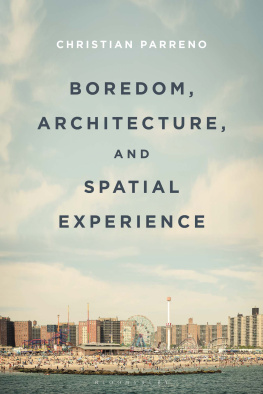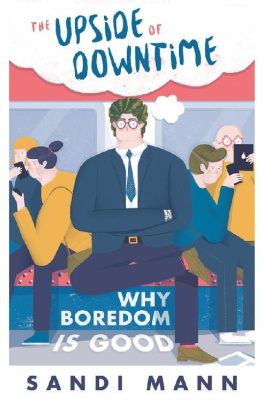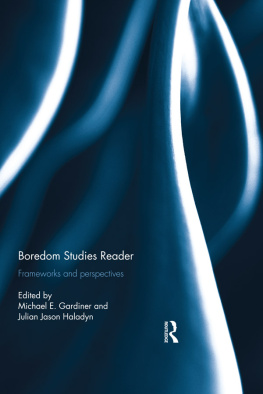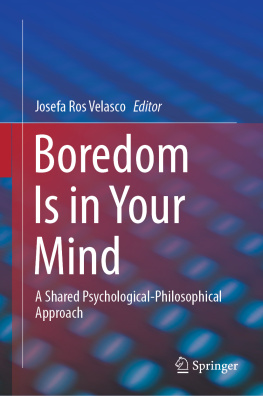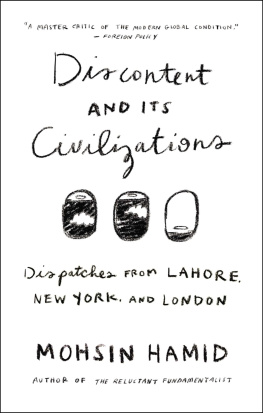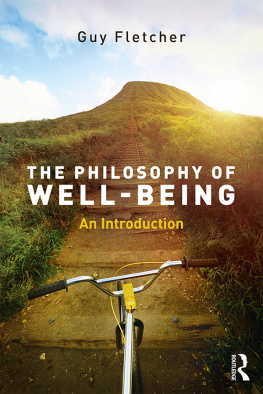Propelled

Oxford University Press is a department of the University of Oxford. It furthers the Universitys objective of excellence in research, scholarship, and education by publishing worldwide. Oxford is a registered trade mark of Oxford University Press in the UK and certain other countries.
Published in the United States of America by Oxford University Press
198 Madison Avenue, New York, NY 10016, United States of America.
Andreas Elpidorou 2020
All rights reserved. No part of this publication may be reproduced, stored in a retrieval system, or transmitted, in any form or by any means, without the prior permission in writing of Oxford University Press, or as expressly permitted by law, by license, or under terms agreed with the appropriate reproduction rights organization. Inquiries concerning reproduction outside the scope of the above should be sent to the Rights Department, Oxford University Press, at the address above.
You must not circulate this work in any other form and you must impose this same condition on any acquirer.
Library of Congress Cataloging-in-Publication Data
Names: Elpidorou, Andreas, author.
Title: Propelled : how boredom, frustration, and anticipation lead us to
the good life / Andreas Elpidorou.
Description: New York, NY : Oxford University Press, [2020] |
Includes bibliographical references and index.
Identifiers: LCCN 2019053132 (print) | LCCN 2019053133 (ebook) |
ISBN 9780190912963 (hardback) | ISBN 9780190912987 (epub) |
ISBN 9780197524343
Subjects: LCSH: Boredom. | Desire. | Quality of life. | Frustration. | Expectation (Philosophy). | Emotions.
Classification: LCC BF575.B67 E45 2020 (print) | LCC BF575.B67 (ebook) |
DDC 158.1dc23
LC record available at https://lccn.loc.gov/2019053132
LC ebook record available at https://lccn.loc.gov/2019053133
To
Lauren,
Rafa,
and
Penelope
There is
no more in life
than in motion,
only because
in motion is
all that is
in life.
Contents
What would you say if someone were to make you the following offer?
Theres a machine that was designed by the worlds pre-eminent neuroscientists and engineers. The machine is too complex to describe it in detail, but, trust me, its been tested and it really works. It reads your every thought and wish; it senses all of your feelings and experiences, even the ones that are too fleeting for you to notice. It carefully alters your brains electrochemical activity, and in doing so, it can produce in you any experience imaginable. These are real experiencesvivid, forceful, and indistinguishable from the ones that youre having right now. If you were connected to this machine, you would never know it. You would think that youre living your life. Everything would be the same, but with one important difference. The machine is programmed to create in you only those experiences that you find pleasurable. It gives you the perfect life, one in which you would have everything that you ever wanted.
Would you connect yourself to the machine?
Would you want to spend your life in the machine?
I offer this hypothetical choice to my philosophy students every semester. I also offer it to friends, acquaintances, and sometimes even to strangers. Almost everybody rejects my offer. Rejection isnt easy to take, so I try to sweeten the deal. I come back with a better pitch. If my interlocutor is religious, I might claim that the machine is heaven on earth. If erudite, I call it the Infinite Jest machine. To aesthetes, I emphasize the machines impeccable design. I bring attention to the inevitable pain and suffering thats contained in our lives and how the machine would erase it. I want people to feel good about the machine, bad about their lives. But, try as I may, the result remains the same. I cant sell it.
Why is that exactly? What could be wrong with always having our desires fulfilled? Imagine: no dull or boring encounters, no frustrating moments, no need to anticipate or wait for future rewards and pleasures. In such a paradise, were surrounded by instant gratification. Bliss, satisfaction, and enjoyment define us. Our every wish is our reality.
What could be wrong with such a life?
Indeed, what could be better?
In this book, I offer answers to these questions. I argue that the good life not only benefits from, but requires the presence of negative experiences. Science and philosophy concur: negative experiences are extremely valuable, often in ways that many of us have not previously considered. Believe it or not, ubiquitous satisfaction and instant fulfillment of our desires dont promote our well-being; they hinder it.
We think of the good life often, and how could we not? We have to. We continually find ourselves faced with decisions and choices that need to be made. Some are trivial and some are not, but how we decide in either case depends, at least to a large extent, on our view of the good life. Simply put, we wish to do whatever brings about or maintains the good life.
But how do we determine what a good life is? How do we know what kind of life is worth pursuing? Heres a thought: To come up with our conception of the good life we simply imagine a life thats saturated with pleasurable and valuable experiences and bereft of disruptive, meaningless, and aversive experiences. As intuitive as it may appear, this exercise of mentally drafting the good life can lead us astray. In trying to fit as much excitement, pleasure, and gratification as possible into our imagined life, we can lose track of an important fact, namely, that life is motion. Life doesnt just have its ups and downs; it is those ups and downs. Life is the desires that we manage to fulfill and those that we dont. Its the things that we gain and the things that we lose. Its the satisfaction we feel when we thrive and the disappointment we experience when we fail.
Life requires failures and pains just as much as it demands successes and pleasures. It does so because life is indisputably a personal thing. No one shares my life. No one shares yours. Whatever else a good life is, it has to be a life that is our own. There is, however, no other way to own a life but to be the subject of its vicissitudes.
To own a life is to author it, and to author it is to try out things for ourselves. It is to strive to uncover and shape our preferences. It is to invest psychological and physical resources in the pursuit of plans. It is to commit to certain objectives and to give up others. Living a life isnt just achieving goals, reaching milestones, or amassing rewards. It is also discovering what goals, milestones, and rewards are worth having in the first place. Make no mistake, such a process of discovery includes effort, struggle, and even sacrifice. Discovery involves trial and error. It requires encounters with the unknown and demands that we, at least sometimes, step out of our comfort zone.
To choose a life of instant and perpetual gratification is to forgo a most integral part of life, namely, the part that relates to the discovery of personal values and to the formation of ones own commitments. To choose constant pleasure over change and motion is to give up choice and ownership; it is to surrender life as we know it. What makes life worth living is none other than what often makes it difficult.

